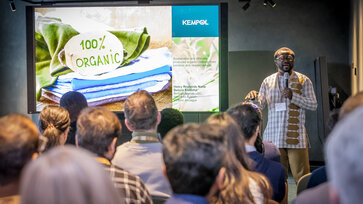Record Number of Applications for Diaspora Start-up Competition
In 2025, members of the diaspora submitted a record number of 142 applications for the start-up competition ‘Business Ideas for Development’ (BID). These applicants want to use their innovative business ideas to promote sustainable development in their countries of origin. The GIZ programme “Shaping development-oriented migration” (MEG) supports them in developing their start-ups with demonstrable success.
The application deadline for the BID start-up competition was 9th March. People with a history of migration from Cameroon, Colombia, Ecuador, Ghana, India, Serbia, Tunisia and Viet Nam living in Germany are eligible for funding. Most of the 142 applications came from Cameroon (29 business ideas), followed by Tunisia (24) and Ghana (23). However, only up to 25 business ideas can be funded.
Henry Nana Enninful took part in the BID start-up competition in 2019. Originally from Ghana, Henry holds a doctorate in physics from the University of Leipzig. Henry became concerned about the tons of second-hand clothing that are imported into Ghana from Europe and the USA, where they pose an environmental risk. He decided to create Kempol Textile – a local company that produces clothing from bamboo and other sustainable wood species which are easily biodegradable. Through this company, he also sought to create jobs as a sustainable way of reducing poverty in his country of origin. Henry was faced by some challenges during this process: finding outstanding seamstresses and positioning himself on the textile market. Henry is not alone in this. An impact study commissioned by the Deutsche Gesellschaft für Internationale Zusammenarbeit (GIZ) GmbH compared a test group of 196 founders who received support from the BID programme between 2016 and 2021, with a control group of 134 rejected applicants. The analysis from 2022 revealed that many BID participants were not sufficiently familiar with their customers, target markets and competitors prior to BID support.
The study showed that BID support helps founders expand their entrepreneurial skills, including business plan development, financial management and human resources. This support significantly increases the success of their start-ups. Additionally, out of the 196 BID alumni surveyed, 66 per cent ended up creating their own companies – this rate is 17.2 per cent higher than the comparison group which did not receive BID support.
Since 2010, the MEG programme and its predecessor programmes have supported members of the diaspora in founding their start-ups. Entrepreneurs like Henry receive assistance in various ways including developing their business models, market analysis, and raising capital. They also receive individual coaching both in Germany and in the partner country, support in networking and a grant for start-up preparation measures. BID-supported start-ups strengthen the sustainable development goals: 54 per cent of these businesses are active in the fields of energy, agriculture, education, health and food production.
Kempol Textile employs a strong team, the majority of whom are women. The business has also proven to be entrepreneurially flexible: during the COVID-19 pandemic, the team made masks from fabric scraps, and they currently also produce sanitary towels from textile waste.
From the 142 applications, the BID team identified 48 business ideas that have the highest potential for sustainable development in the partner countries. The aspiring entrepreneurs then presented their business ideas to a panel of experts. By the end of April, the best business ideas will be notified of their selection, allowing them to start bringing their innovative visions to life.

More data on diaspora entrepeneurs
In this document, we report the main findings of an impact evaluation of the BID initiative. A key finding is that this support enhances business viability and the likelihood of starting a business. Read more below.


